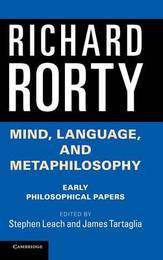
|
Mind, Language, and Metaphilosophy: Early Philosophical Papers
Hardback
Main Details
Description
This volume presents a selection of the philosophical essays which Richard Rorty wrote during the first decade of his career, and complements four previous volumes of his papers published by Cambridge University Press. In this long neglected body of work, which many leading philosophers still consider to be his best, Rorty develops his views on the nature and scope of philosophy in a manner which supplements and elucidates his definitive statement on these matters in Philosophy and the Mirror of Nature. He also develops his groundbreaking version of eliminative materialism, a label first coined to describe his position, and sets out original views on various central topics in the philosophy of language, concerning private language, indeterminacy, and verificationalism. A substantial introduction examines Rorty's philosophical development from 1961 to 1972. The volume completes our understanding of Rorty's intellectual trajectory and offers lucid statements of positions which retain their relevance to current debates.
Author Biography
Richard Rorty (1931-2007) was Professor of Comparative Literature and Philosophy at Stanford University. Stephen Leach is an Honorary Fellow of the Research Institute for Law Politics and Justice at Keele University. He is the author of The Foundations of History (2009), and co-author, with James Connelly and Peter Johnson, of R. G. Collingwood: A Research Companion (2014). James Tartaglia is Senior Lecturer in Philosophy at Keele University. He is the author of Rorty and the Mirror of Nature (2007) and Philosophy in a Meaningless Life (forthcoming), and editor of Richard Rorty: Critical Assessments of Leading Philosophers (2009).
Reviews'[Rorty's] papers here, all of them, provide a rousing introduction to this revolutionary phase of modern philosophy, and they would support an insightful graduate seminar into the issues that there gripped our own discipline. The editors of this volume are to be congratulated.' Paul Churchland, Notre Dame Philosophical Reviews
|